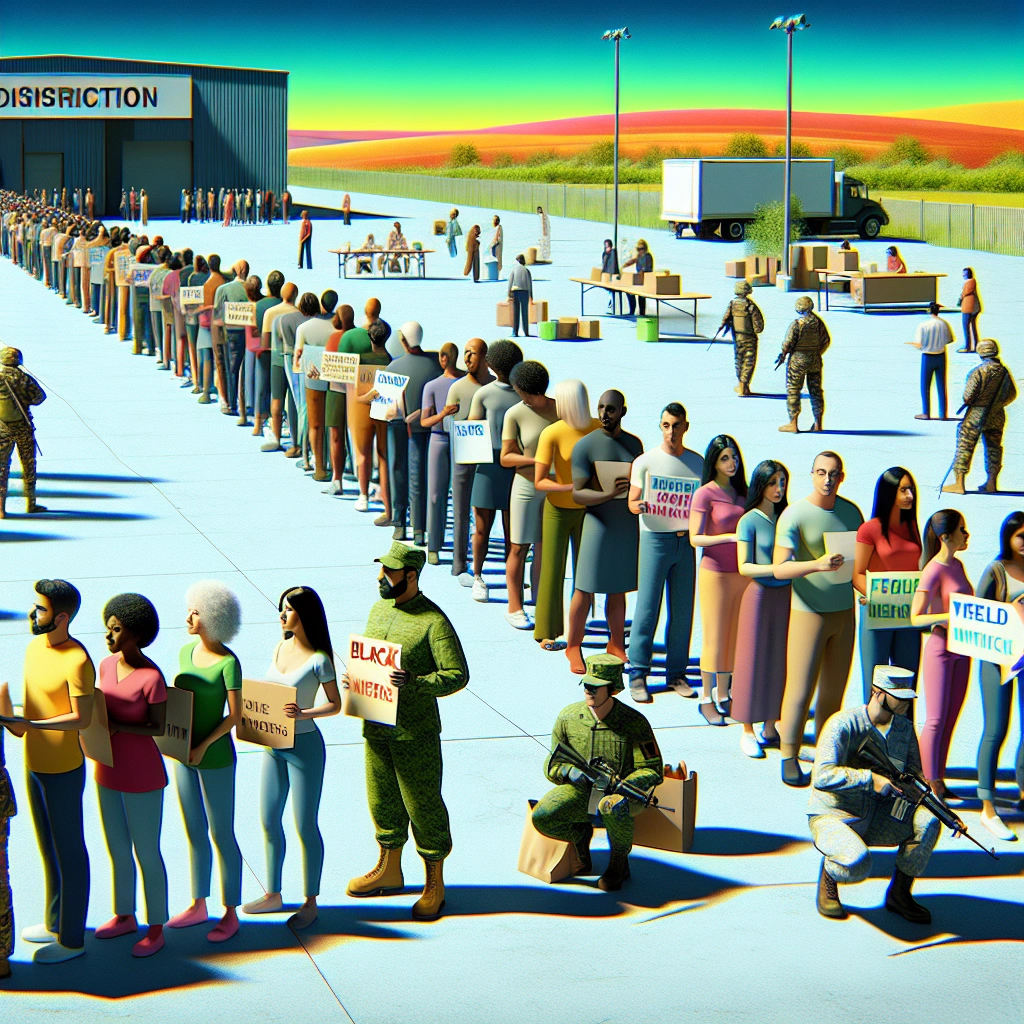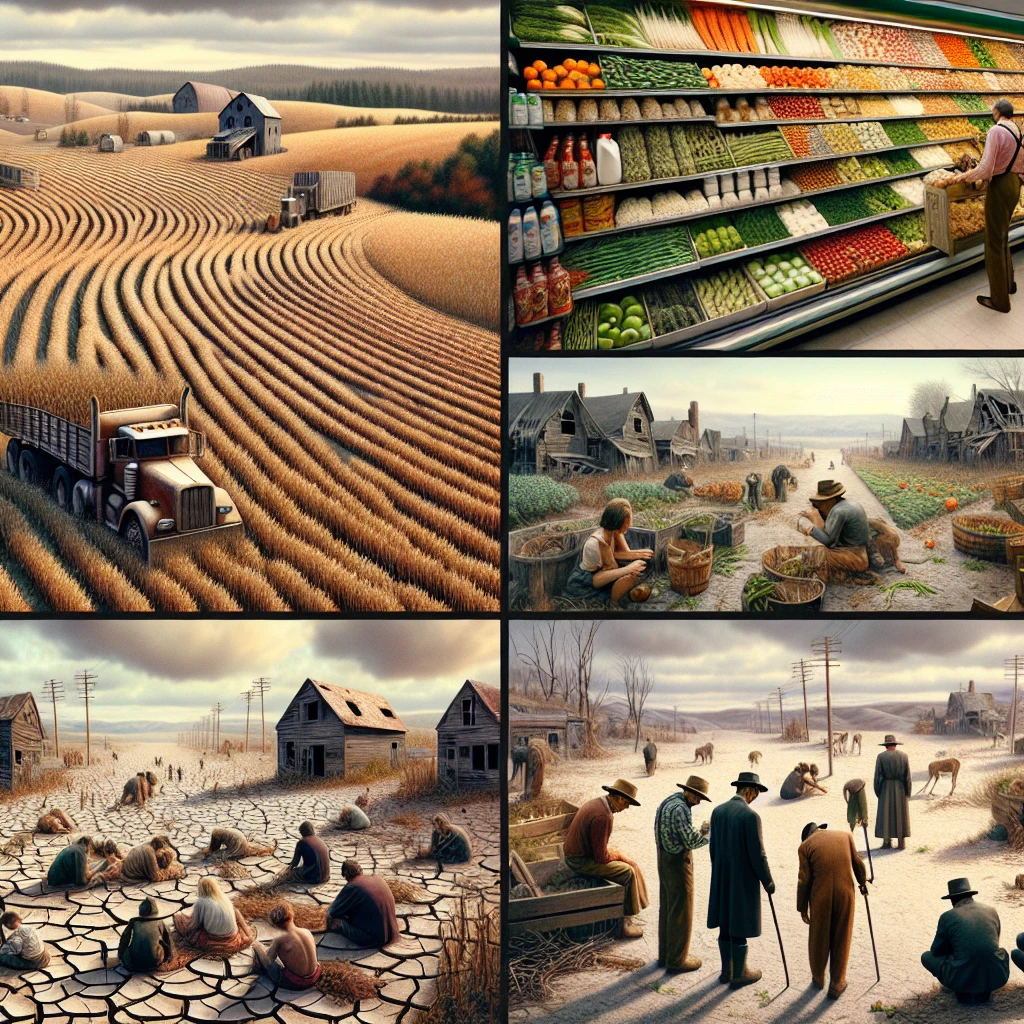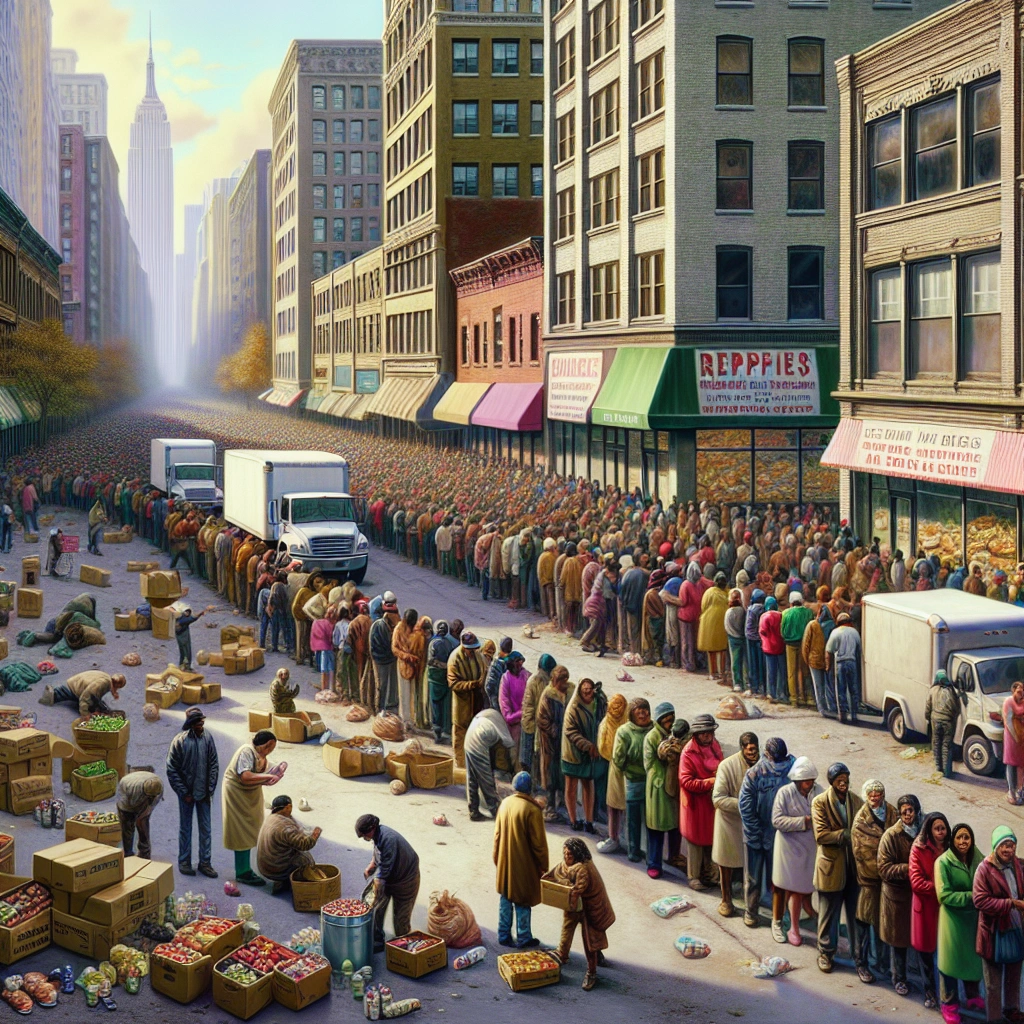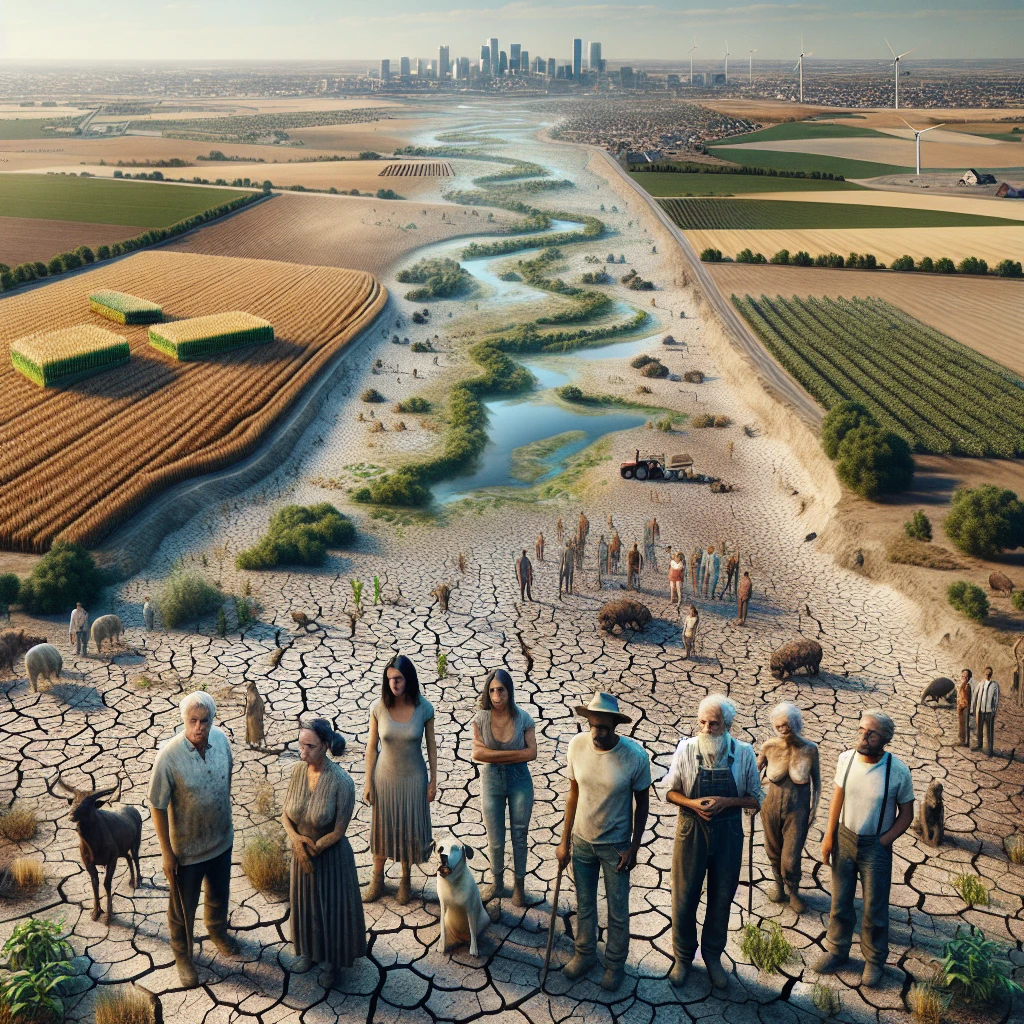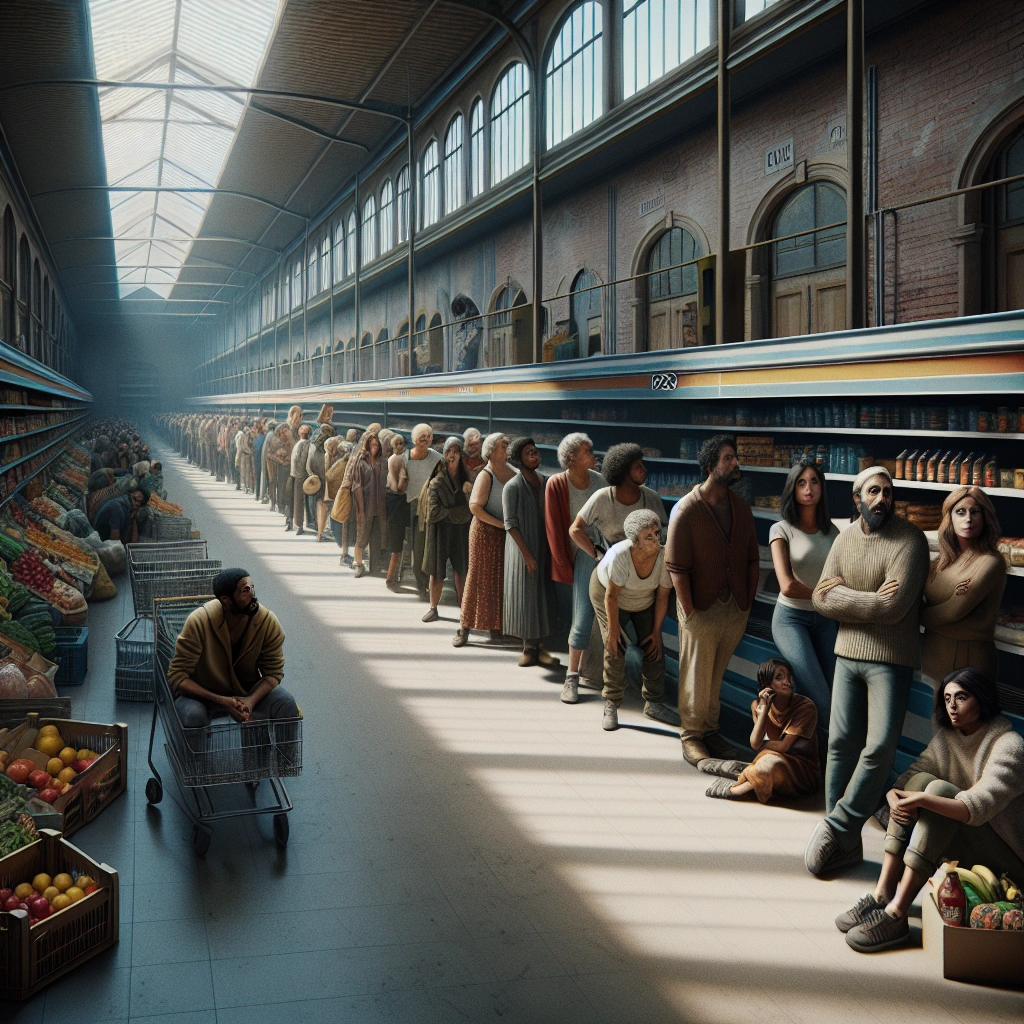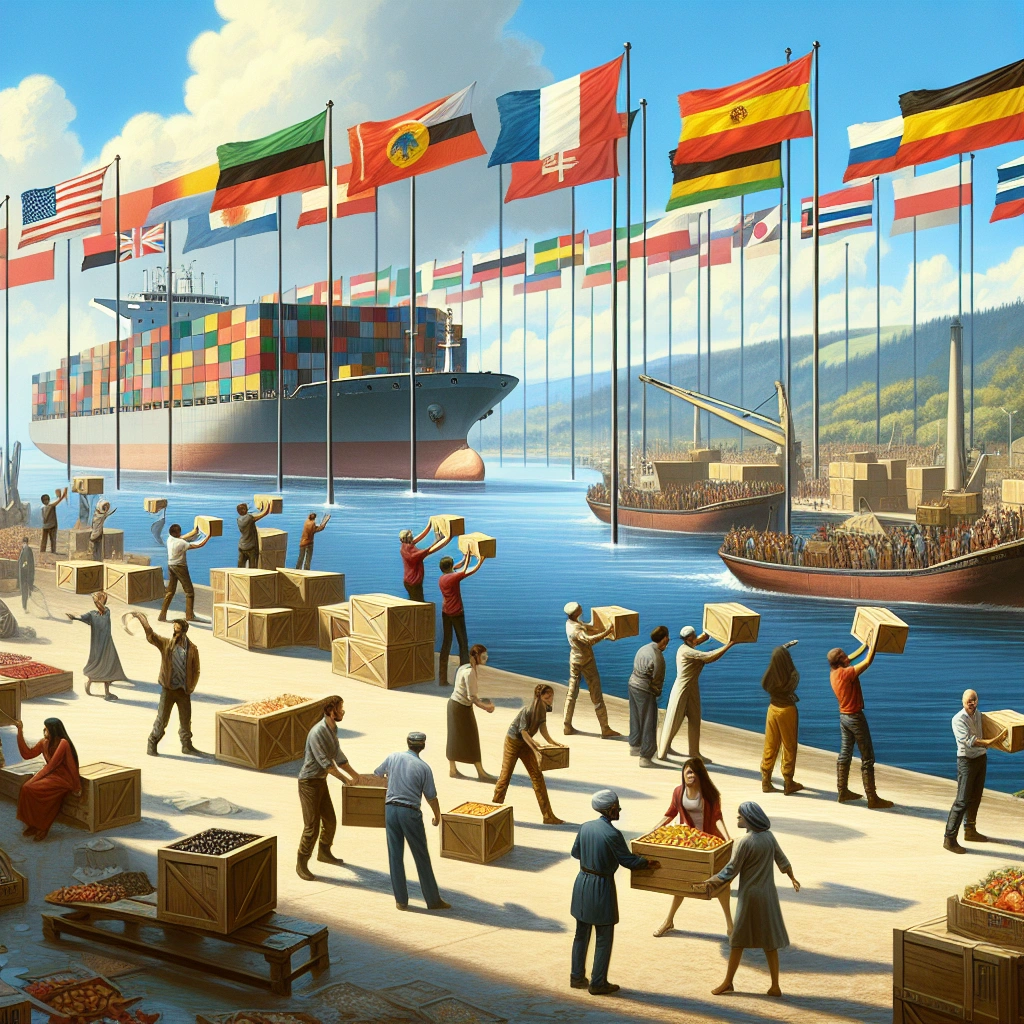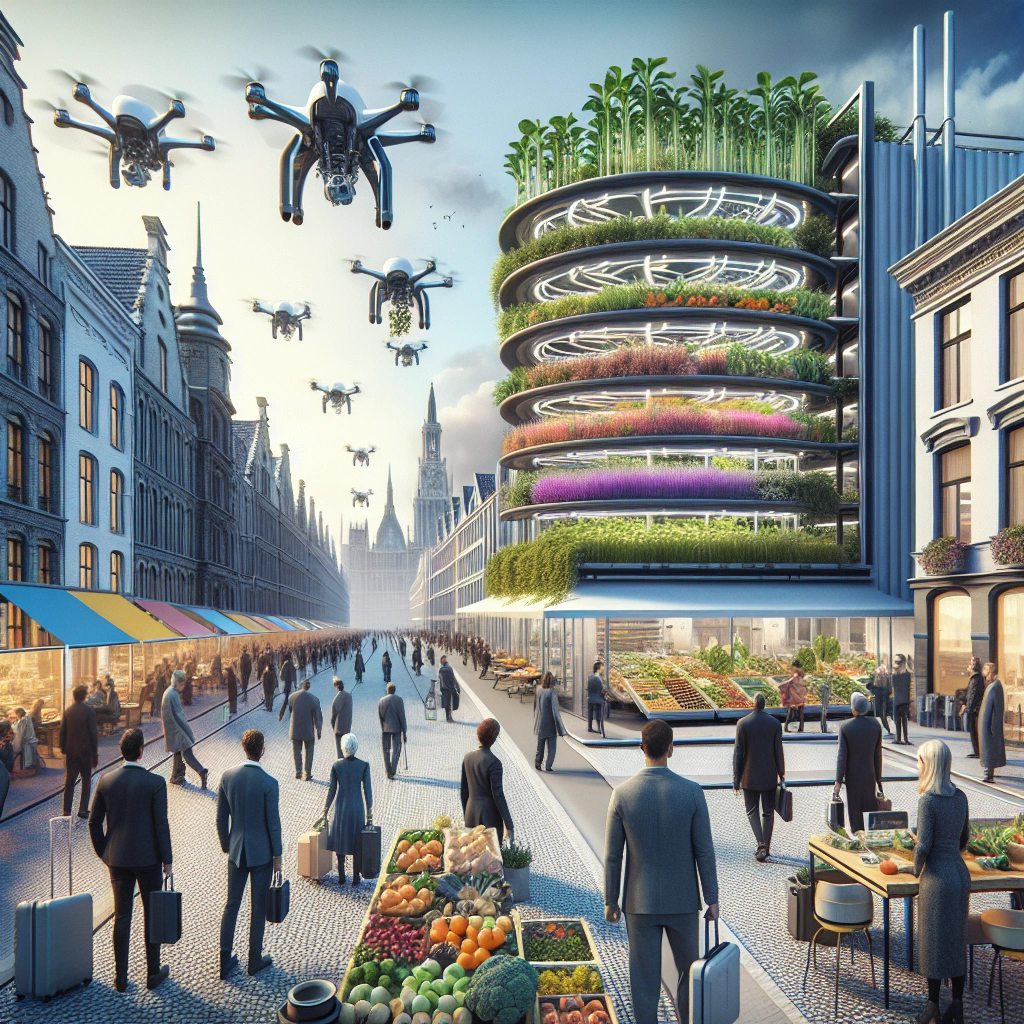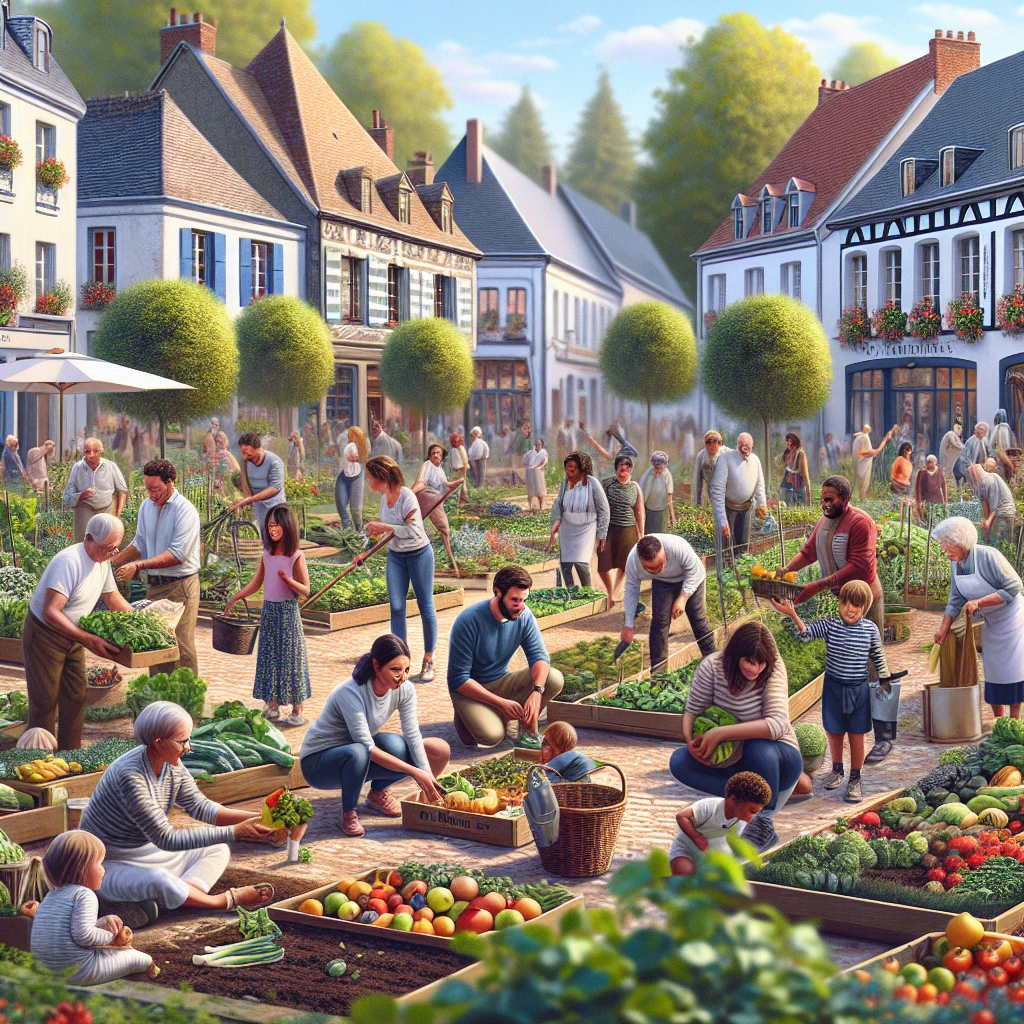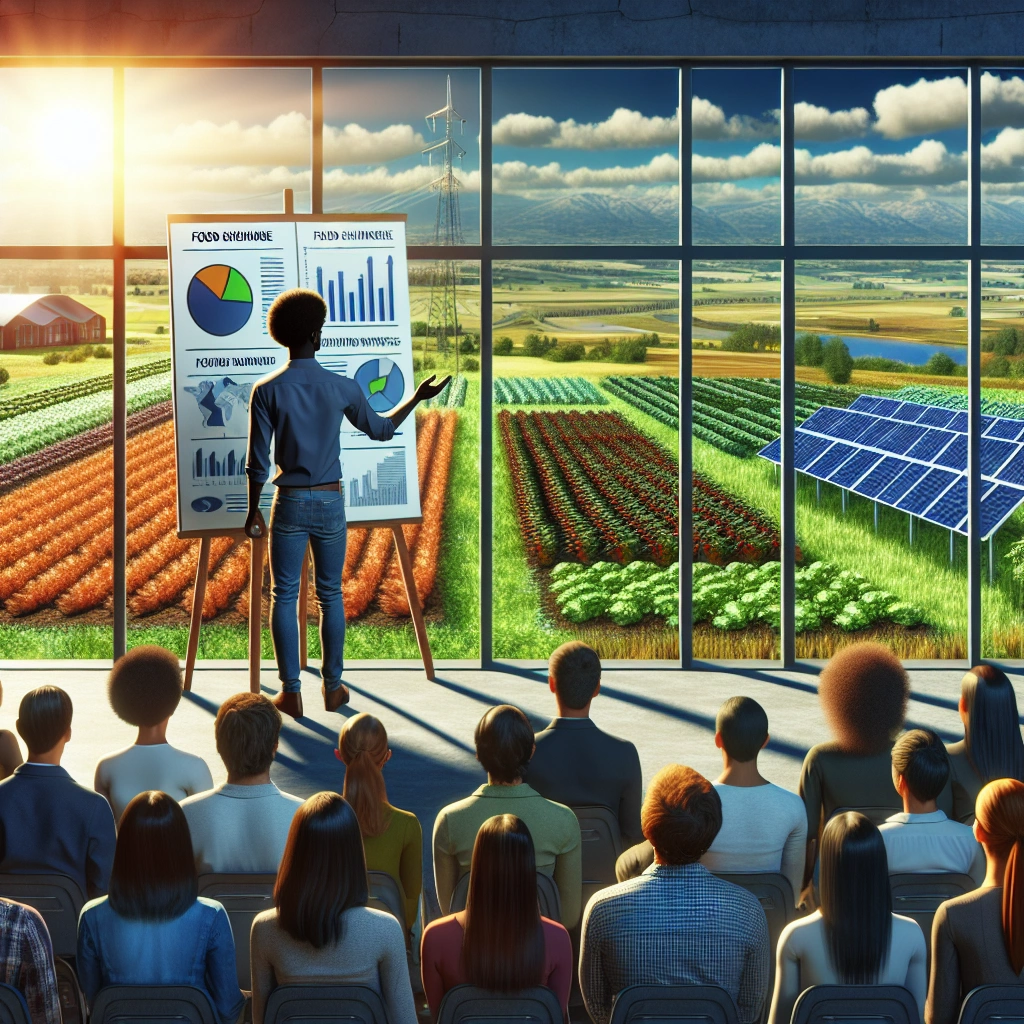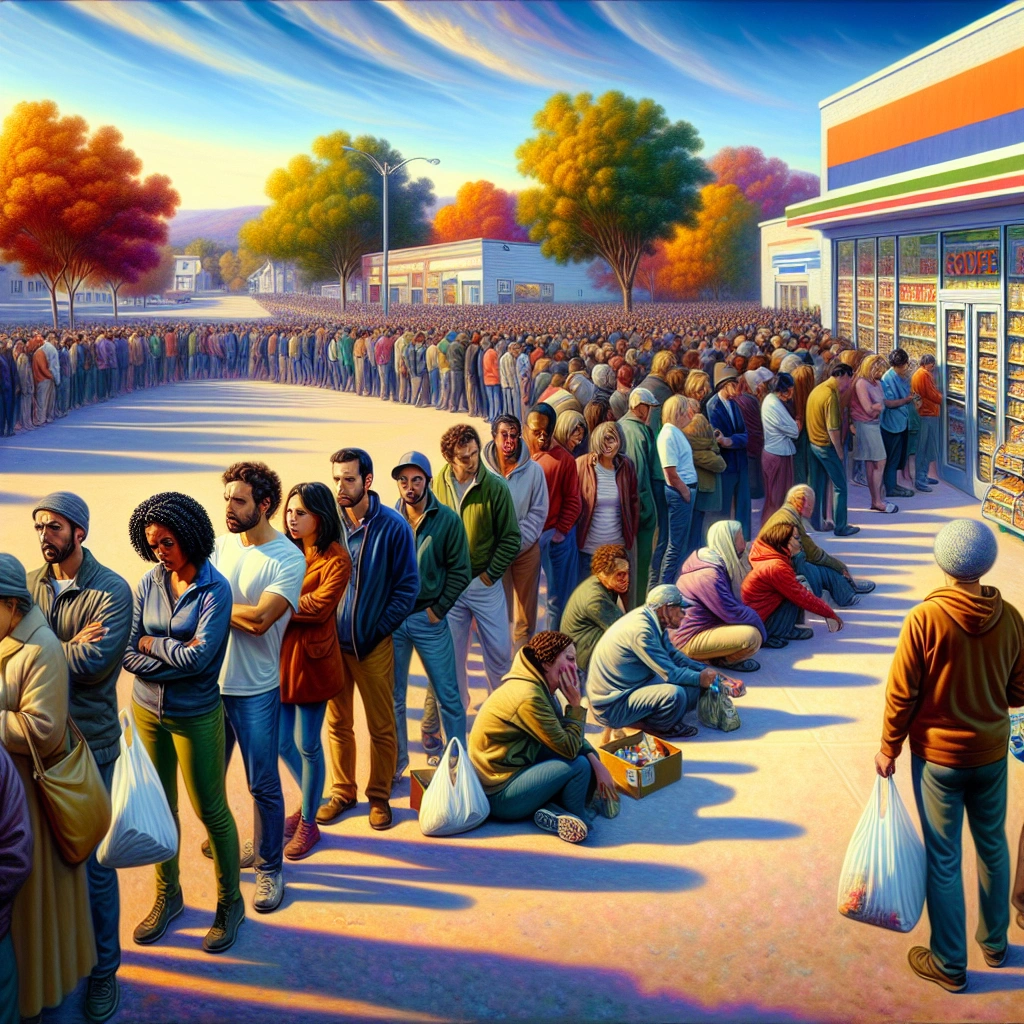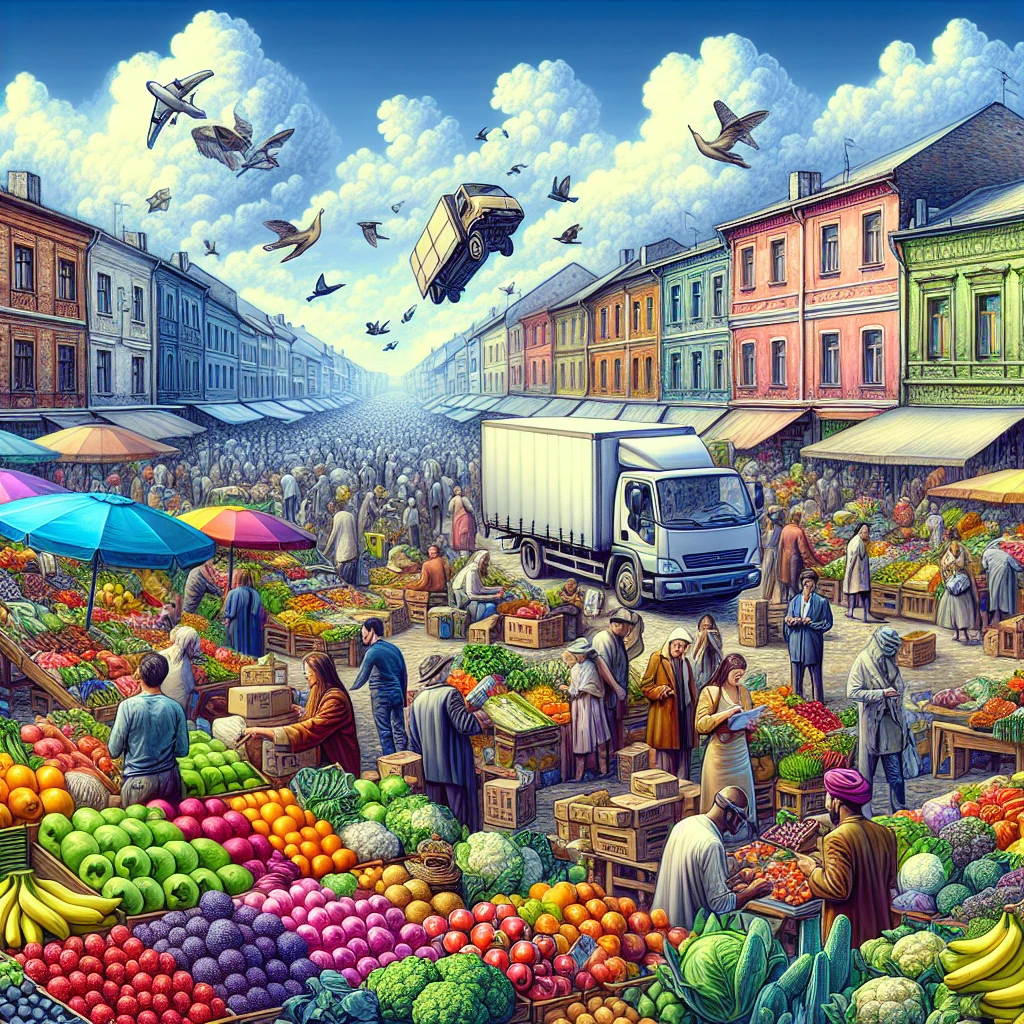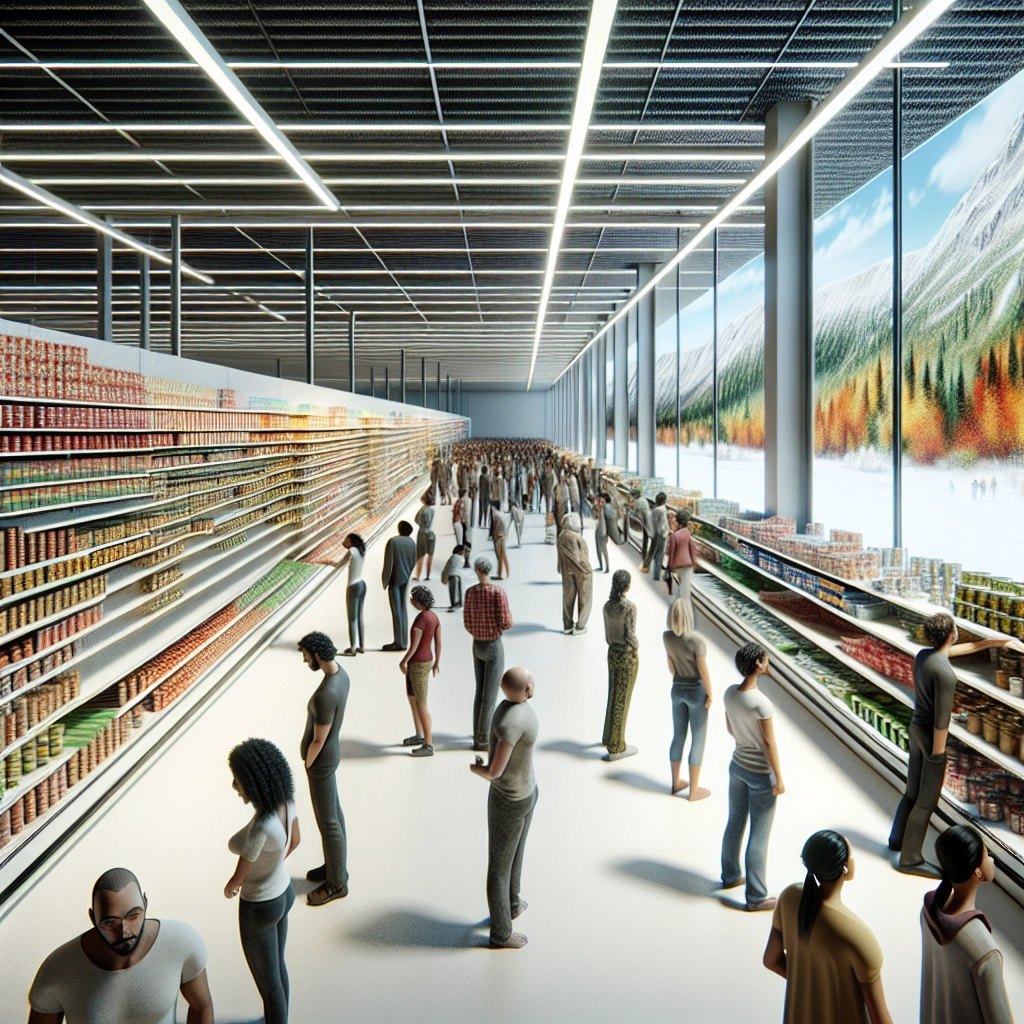

Europe is currently facing a food shortage in 2023, with the prevalence of moderate or severe food insecurity rising slightly to 8.0 percent. This situation has been exacerbated by factors such as the war in Ukraine, the European Green Deal, the COVID-19 pandemic, and inflation, leading to high food prices and scarcity of supplies.
It is crucial to address this issue in Europe due to the impact of food shortage on the livelihoods of millions of people. High food prices and scarcity of supplies are causing individuals to struggle to access food, making food security and affordability a top concern for EU leaders.
The situation calls for immediate action to ensure that vulnerable households are supported and investments are made in sustainable food security to mitigate the crisis.
The global food crisis in Europe demands support for people and open recognition of the escalating crisis. It is important to tackle this issue by supporting production and producers, facilitating increased trade in food and production inputs, and investing in sustainable food security to address the challenges posed by the food shortage in Europe.
Check out this Youtube video: “Commissioner Urpilainen on food crisis – YouTube” to stay informed about the potential food shortage in Europe in 2023 and the steps being taken to address it.
Causes of Food Shortage
Impact of extreme weather conditions on crop production
The impact of extreme weather conditions on crop production in Europe is a significant factor contributing to the food shortage. With the increase in extreme weather events such as floods, droughts, and heatwaves, the risk of large-scale crop failure has intensified.
This has led to a decrease in crop yields, affecting the overall food supply in the region.
Disruption in supply chains due to political and economic factors
Political and economic factors have also played a crucial role in disrupting the supply chains, further exacerbating the food shortage in Europe. Heightened political and economic volatility has led to supply chain disruptions, making it challenging to transport and distribute essential food supplies to various regions.
This has created a strain on the overall food distribution network.
Effects of the COVID-19 pandemic on food distribution
The COVID-19 pandemic has had a profound impact on food distribution in Europe, contributing to the ongoing food shortage. The pandemic resulted in lockdown restrictions, panic buying, and supply chain disruptions, leading to a significant rise in food prices and scarcity of essential food items.
Additionally, the availability of labor for agricultural operations faced challenges, further impacting food production and distribution.
| Factors | Impact |
|---|---|
| Extreme Weather | Decreased crop yields, large-scale crop failure |
| Supply Chain Disruption | Challenging transportation and distribution of food |
| COVID-19 Pandemic Effects | Increased food prices, scarcity, labor challenges |
The combination of these factors has created a challenging environment for food production and distribution in Europe, resulting in a notable food shortage in 2023.
Consequences of Food Shortage
Increased food prices are placing a heavy financial burden on households across Europe. Families are struggling to afford basic necessities, forcing them to make difficult choices between food, housing, and other essential expenses.
This financial strain is leading to heightened stress and anxiety, impacting the overall well-being of individuals and families. The rising cost of food is exacerbating economic inequalities, pushing vulnerable populations further into poverty and food insecurity.
Malnutrition is becoming a pressing public health concern amidst the food shortage in Europe. As food prices soar, many individuals and families are forced to compromise on the nutritional quality of their diets, leading to deficiencies in essential nutrients.
This, in turn, heightens the risk of malnutrition, impacting physical and cognitive development, especially among children. The long-term consequences of malnutrition include increased susceptibility to various diseases, higher healthcare costs, and a compromised quality of life.
The food shortage in Europe is contributing to social and political unrest, posing significant challenges to stability and governance. As food insecurity deepens, it fuels social discontent, leading to protests, civil unrest, and potential conflicts.
The growing discontent among the population creates a volatile environment, straining social cohesion and posing challenges for political leadership. Addressing food insecurity becomes not only a humanitarian necessity but also a crucial step in maintaining social order and stability.
| Consequence | Impact |
|---|---|
| Financial strain on households | Heightened economic inequalities and increased poverty rates |
| Malnutrition and public health | Risks of physical and cognitive developmental issues, increased healthcare costs |
| Social and political unrest | Threats to social stability and governance, potential for civil unrest and conflicts |
The consequences of food shortage extend beyond economic implications, encompassing public health and social stability. Addressing these challenges requires concerted efforts from both policymakers and the community to mitigate the impacts and ensure the well-being of the population.
Current Government Response
Policies and initiatives aimed at addressing the food shortage
The government has taken swift action to address the food shortage crisis in Europe. By implementing policies that focus on boosting domestic food production, promoting sustainable farming practices, and providing financial aid to struggling farmers, the government aims to mitigate the impact of the food shortage on its citizens.
International collaborations to mitigate the crisis
To tackle the food shortage crisis, the government has actively sought international collaborations with neighboring countries, international organizations, and global food suppliers. This includes forging partnerships to facilitate the import of essential food items, sharing best practices in food conservation, and coordinating efforts to ensure equitable distribution of food resources across borders.
Public awareness campaigns about food conservation and sustainable consumption
The government has launched extensive public awareness campaigns to educate the population about food conservation and sustainable consumption practices. These campaigns aim to promote mindful food consumption, reduce food wastage, and encourage individuals to embrace sustainable dietary choices. Additionally, the government is collaborating with local NGOs and educational institutions to empower communities with the knowledge and tools to combat the food crisis at the grassroots level.
| Initiatives | Impact |
|---|---|
| Agricultural subsidies | Boosts local food production and affordability |
| Cross-border food distribution | Ensures equitable access to essential food supplies |
| Educational outreach programs | Promotes sustainable food consumption and waste reduction |
This comprehensive approach underscores the government’s commitment to addressing the food shortage crisis and safeguarding the well-being of its citizens.
Impact on Agriculture
The challenges faced by farmers and agricultural businesses are immense, especially in the wake of potential food shortages in Europe in 2023. Climate change is a significant challenge, altering weather patterns and leading to extreme conditions that impact food production. Moreover, rising costs of fuel and fertilizers are adding to the burden, affecting the profitability of farming operations and threatening food security. These challenges necessitate innovative solutions that can improve agricultural productivity and address the impending food shortage.
Innovation and technology play a crucial role in increasing food production to combat the projected food shortages in Europe. Advancements such as precision farming, drip irrigation, and mechanization have significantly enhanced agricultural productivity, reduced operational costs, and improved food quality.
The integration of digital technology has the potential to make agrifood practices more sustainable and efficient, leading to a more resilient food production system.
Sustainable farming practices hold the key to addressing food shortages by ensuring long-term food security. The role of sustainable agriculture in promoting organic farming and diversifying production methods is essential for the sustainable management of resources and the reduction of environmental impact.
By prioritizing sustainable agriculture, it is possible to achieve improved nutrition, food security, and the promotion of sustainable development goals.
| Challenges Faced by Farmers and Agricultural Businesses | Importance of Innovation and Technology in Increasing Food Production | Role of Sustainable Farming Practices in Addressing Food Shortages |
|---|---|---|
| Climate change and extreme weather events | Advancements like precision farming and drip irrigation | Promotion of organic farming and resource diversification |
| Rising costs of fuel and fertilizer | Integration of digital technology for sustainable agrifood | Sustainable management of resources and reduced environmental impact |
Food Waste and Distribution
Examination of the impact of food waste on the shortage crisis
- Food Waste: The Silent Contributor
Food waste significantly exacerbates the shortage crisis, with 2.5 billion metric tons of food lost annually, enough to feed two billion people and combat global hunger. Failing to address food waste perpetuates unnecessary greenhouse gas emissions, intensifying climate change and perpetuating food insecurity globally.
Improvements in distribution networks to ensure equitable access to food
- Equitable Distribution Networks
Creating equitable distribution networks is crucial to ensure fair access to food. Incentivizing financial markets and investors to direct more funding towards food systems in regions and countries, and promoting high-quality jobs with living wages, helps bridge the gap and ensures economic opportunities in the food distribution chain. Moreover, expanding online shopping options for government assistance recipients furthers accessibility.
Initiatives to reduce food waste at the consumer and industrial levels
- Reducing Food Waste: A Collective Effort
Implementing changes and innovations in the food industry is pivotal in curbing consumer waste. By promoting circular food systems, measuring and tracking all food storage, and creating “Food Rescue” systems, we can minimize food waste at the consumer and industrial levels. Additionally, setting a national reduction goal of 50% by 2030 can drive collective efforts to reduce food loss and waste, aligning with key environmental and sustainability objectives.
| Strategies for Reducing Food Waste |
|---|
| Pathway 1: Change the U. S. Food Environment to Discourage Waste by Consumers. |
| Measuring and tracking all food storage. |
| Creating a “Food Rescue” system. |
| Promoting statewide consumer awareness. |
Case Studies
Analysis of specific countries or regions experiencing severe food shortages
| Country/Region | Severity of Food Shortage | Contributing Factors |
|---|---|---|
| Burkina Faso | Famine (IPC/CH Phase 5) | Conflict, Economic Shocks, Weather Extremes |
| Mali | Emergency (IPC/CH Phase 4) | Persistent Conflict, Economic Shocks, Weather Extremes |
| Palestine | Crisis or worse (IPC/CH Phase 3) | Conflict, Economic Shocks, Weather Extremes |
| South Sudan | Famine (IPC/CH Phase 5) | Conflict, Economic Shocks, Weather Extremes |
| Sudan | Famine (IPC/CH Phase 5) | Conflict, Economic Shocks, Weather Extremes |
Success stories of communities or organizations tackling the crisis
- Civil society organizations rapidly responded to the crises caused by the Russian invasion, providing life-saving support.
- Community-based climate action initiatives have been successful in addressing the local impacts of the global climate crisis.
- Small cities like Biddeford, Maine, and Golden, Colorado, effectively engaged their communities to address unique challenges.
Lessons that can be learned from past food shortage experiences in Europe
- Cooperation is crucial in mitigating food crises.
- Maintaining steady economic growth and stability is vital for food security.
- Swift and effective responses from civil society and local communities play a significant role in crisis management.
In times of dire conditions, it’s essential to analyze the severity of food shortages in specific countries or regions, such as Burkina Faso, Mali, Palestine, South Sudan, and Sudan. These areas are grappling with a range of challenges, including conflict, economic shocks, and weather extremes.
Despite the adversity, there are inspiring success stories of civil society organizations and communities effectively addressing the crisis, demonstrating the power of swift and decisive action. From these experiences, valuable lessons emerge, emphasizing the significance of cooperation, economic stability, and the pivotal role of local communities in crisis management.
Environmental Impact
The connection between food shortage and environmental issues is undeniable. Droughts, extreme weather events, and changing climate patterns directly impact food production, leading to shortages and price fluctuations.
Additionally, unsustainable agricultural practices contribute to soil degradation, water pollution, and greenhouse gas emissions, exacerbating environmental challenges and further affecting food security.
Importance of sustainable agricultural practices for long-term food security cannot be overstated. By implementing sustainable farming methods such as crop rotation, organic farming, and water conservation, we can enhance soil fertility, protect biodiversity, and minimize the negative impact on the environment.
These practices promote long-term food security by ensuring consistent and reliable access to nutritious food while preserving natural resources for future generations.
Strategies for mitigating the environmental impact of food shortages involve a multi-faceted approach. This includes investing in resilient agricultural infrastructure, promoting sustainable water management, and supporting local and circular food systems.
Additionally, diversifying food sources, enhancing food storage systems, and implementing climate-smart technologies can help minimize the environmental impact of food shortages while ensuring food security for all.
| Strategies for Mitigating Environmental Impact |
|---|
| 1. Invest in resilient agricultural infrastructure |
| 2. Promote sustainable water management |
| 3. Support local and circular food systems |
| 4. Diversify food sources |
| 5. Enhance food storage systems |
| 6. Implement climate-smart technologies |
These comprehensive strategies aim to address the environmental challenges associated with food shortages while laying the foundation for a sustainable and resilient food system.
Socioeconomic Factors
Disparities in access to food based on socioeconomic status
Low-income groups often struggle to access nutritious food due to financial constraints, leading to a reliance on cheaper, less nutritious options. This creates disparities in the healthiness of food choices, as healthier items are often more expensive and less accessible in low-income neighborhoods compared to larger chain supermarkets.
The cost of healthy diets plays a crucial role in addressing socioeconomic disparities in food purchasing choices, highlighting the need for affordable, nutritious food options for all socioeconomic groups.
Impact of food shortage on vulnerable populations
Food shortages have a severe impact on vulnerable populations, heightening the risk of food insecurity and malnutrition. Inadequate access to affordable, nutritious food results in increased susceptibility to chronic health conditions and malnutrition.
Vulnerable populations, including those with low socioeconomic status, are particularly affected by hunger and malnutrition, leading to substantial human suffering and economic costs. The lack of food security exacerbates existing health disparities and underscores the urgency of addressing food shortages to protect vulnerable communities.
Intersectionality between food security, poverty, and other social issues
The intersectionality between food security, poverty, and other social issues is evident in the complex relationship between race/ethnicity, food insecurity, and established determinants of food shortages. Poverty and growing inequality are key underlying causes of food insecurity, compromising the right to adequate food for millions of individuals.
Furthermore, the association between poverty and food insecurity among children emphasizes the critical link between socioeconomic status and access to nutritious food, highlighting the broader social and economic implications of food shortages.
| Vulnerable Populations | Impact |
|---|---|
| Low-income groups | Heightened risk of food insecurity and malnutrition |
| Individuals with low socioeconomic status | Increased susceptibility to chronic health conditions and hunger |
| Children in impoverished households | Urgent need for addressing food shortages to protect vulnerable communities |
Remember, we need to understand and address the socioeconomic impact of food shortage issues, ensuring equitable access to nutritious food for all.
Future Projections
Predictions for the trajectory of the food shortage crisis in Europe
The food shortage crisis in Europe is expected to follow a concerning trajectory in the coming years. As climate change continues to impact agricultural production and global trade, experts predict a steady increase in food scarcity across the continent.
Unprecedented weather patterns and environmental shifts are likely to exacerbate the situation, leading to greater strain on food supplies and distribution networks. Additionally, socioeconomic factors such as population growth and income inequality are anticipated to contribute to the persistence of the crisis, posing significant challenges to food security in Europe.
Potential long-term solutions to address food insecurity
To combat food insecurity in the long term, comprehensive strategies must be implemented. These include investments in sustainable agriculture, technological innovations to enhance crop yields, and the promotion of responsible consumption practices.
Furthermore, prioritizing support for small-scale farmers, improving rural infrastructure, and implementing effective trade policies can help create a more resilient and equitable food system. By addressing the root causes of food insecurity and fostering collaboration among nations, a sustainable and inclusive approach can be established to ensure adequate access to nourishment for all European citizens.
Forecasting the impact of food shortage on global markets and trade
The impact of food shortage in Europe is projected to reverberate across global markets and trade relationships. As the European Union grapples with food scarcity, international supply chains and commodity prices are expected to face significant disruptions.
Shifts in consumer demand, alongside potential trade restrictions, could lead to widespread economic implications on a global scale. Furthermore, fluctuations in food prices and availability may affect the livelihoods of agricultural producers and the purchasing power of consumers worldwide.
It is crucial for global stakeholders to proactively address the potential ramifications of the food shortage crisis on trade dynamics and collaborate towards sustainable solutions.
| Hunger Index | Projected Food Shortage Impact |
|---|---|
| High-Income Countries | Moderate Impact |
| Middle-Income Countries | Severe Impact |
| Low-Income Countries | Catastrophic Impact |
The future trajectory of the food shortage crisis in Europe demands proactive measures and international cooperation. By identifying potential challenges, implementing long-term solutions, and forecasting global impacts, stakeholders can navigate the complexities of food insecurity and work towards a more resilient and equitable food ecosystem.
This response aims to provide a comprehensive overview of the future projections related to the “Europe food shortage 2023”. It addresses the predictions, potential solutions, and global impact, offering a holistic perspective on the critical issue of food security in Europe.
International Aid and Collaboration
Role of international organizations in providing aid to countries facing food shortages
The role of international organizations in addressing food shortages in Europe in 2023 is crucial. Organizations like the World Food Programme (WFP) and the World Bank are working tirelessly to provide food assistance to millions of people in affected countries.
The WFP alone assists around 86.7 million people in approximately 83 countries annually, showcasing the significant impact of international aid efforts in combating food scarcity.
Importance of collaboration between European nations in addressing the crisis
Collaboration between European nations is paramount in addressing the food shortage crisis in 2023. The European Union and its member states possess various policy levers to tackle the crisis, including agricultural, trade, environmental, aid, and energy policies. By working together, these nations can ensure food security, stabilize prices, and effectively combat the escalating crisis, highlighting the critical importance of collaboration on a regional level.
Potential for diplomatic and trade agreements to alleviate food scarcity
Diplomatic and trade agreements have the potential to alleviate food scarcity in Europe by facilitating increased trade in food and production inputs. Additionally, developing climate-resilient agriculture through partnerships and collaborations among key players in the agricultural sector can play a significant role in stabilizing the global food system.
By focusing on diplomacy to manage alliances and prevent conflicts, nations can work towards long-term solutions to address the food shortage crisis in 2023 effectively.
| Collaborative Approach | Key Impact |
|---|---|
| Regional Policy Leveraging | Ensures food security and price stabilization |
| Climate-Resilient Agriculture | Stabilizes the global food system |
Let’s make Europe’s battle against food shortage a unified effort!
Public Health Implications
Relationship between food shortage and public health crises
The relationship between food shortage and public health crises is undeniable. When individuals and communities lack access to nutritious food due to shortages, it leads to malnutrition and a higher risk of developing various health issues.
These issues can range from stunted growth in children to a weakened immune system in adults, making them more susceptible to diseases and infections. Additionally, food shortages can exacerbate mental health challenges, leading to stress, anxiety, and depression.
Strategies for ensuring access to nutritious food during shortages
Implementing strategic measures to ensure access to nutritious food during shortages is crucial for mitigating public health crises. This can involve government intervention to provide subsidies for essential food items, creating community food distribution programs, and promoting urban agriculture initiatives to increase local food production.
Additionally, collaborations between non-profit organizations and food suppliers can aid in distributing surplus food to those in need, reducing food waste while addressing scarcity.
Long-term health consequences of prolonged food insecurity
Prolonged food insecurity has severe long-term health consequences that extend beyond immediate food shortages. Individuals who experience consistent food insecurity are at a higher risk of developing chronic health conditions such as cardiovascular diseases, diabetes, and obesity.
Moreover, food insecurity can also affect mental well-being, leading to increased vulnerability to anxiety disorders, depression, and other mental health ailments. It’s essential to address the root causes of food insecurity to prevent these long-term health implications, safeguarding the overall well-being of communities.
Innovation and Technology
Role of technology in increasing food production and distribution
The role of technology in increasing food production and distribution is pivotal in addressing the looming food shortages in Europe. Advanced agricultural technologies such as precision farming, automated machinery, and data-driven insights enable farmers to optimize crop yields while minimizing resource wastage.
Additionally, the integration of IoT devices and sensors allows for real-time monitoring of environmental conditions, enhancing precision in irrigation and pest control. Furthermore, AI-driven algorithms can forecast market demands, streamlining distribution channels for more efficient food supply management.
Examples of innovative solutions to address food shortages
Innovative solutions to address food shortages encompass a wide array of technologies. For instance, 3D printing in food production presents a groundbreaking approach to creating alternative food sources with minimal environmental footprint.
Additionally, virtual representations of physical assets, known as digital twins, leverage cloud, AI, and IoT technologies to optimize agricultural practices. Moreover, the use of drones in crop monitoring and logistics streamlines data collection, offering valuable insights for targeted resource allocation to boost food production.
Potential for technological advancements to revolutionize agriculture in Europe
The potential for technological advancements to revolutionize agriculture in Europe is vast. Agri-tech innovations, including farm automation, AI, and robotics, are revolutionizing traditional farming practices, reducing operational costs, and addressing labor shortages.
Moreover, investment in digitalization, solar energy-powered irrigation, and rural infrastructure can pave the way for increased agricultural resilience. As Europe embraces the digital transformation of farming, the future promises heightened food production, sustainable resource management, and greater food security for the continent.
| Innovative Solution | Impact |
|---|---|
| Precision Farming | Optimizes crop yields and minimizes resource wastage |
| Automated Machinery | Enhances efficiency in agricultural operations |
| 3D Printing in Food Production | Provides alternative food sources with minimal environmental impact |
| Digital Twins | Optimizes agricultural practices through data-driven insights |
| Farm Automation | Reduces operational costs and addresses labor shortages |
These technological advancements are not just fancy jargon but will actually revolutionize the way food is produced and distributed. The future of agriculture in Europe looks promising, and these innovations will play a critical role in addressing food shortages and ensuring sustainable food security.
Community Action
Grassroots efforts to combat food shortage at the local level
As we face the challenges of Europe food shortage 2023, it’s crucial for local communities to come together and take proactive measures. Grassroots efforts play a vital role in combating food shortage at the local level, as they allow communities to address immediate needs and tailor solutions to their specific circumstances.
By organizing community gardens, food drives, and meal delivery programs, local residents can make a significant impact on alleviating food insecurity within their neighborhoods.
Importance of community engagement in addressing the crisis
The importance of community engagement in addressing the Europe food shortage 2023 cannot be overstated. When local residents, businesses, and organizations collaborate and engage in initiatives aimed at addressing food insecurity, they foster a sense of shared responsibility and create a more sustainable support system.
Community engagement empowers individuals to contribute to long-term solutions, encourages innovative approaches, and ensures that the specific needs of the community are met effectively.
Examples of successful community-led initiatives to reduce food insecurity
There are inspiring examples of successful community-led initiatives that have made a substantial difference in reducing food insecurity. For instance, community-run food banks, neighborhood food co-ops, and meal-sharing programs have effectively provided essential nutrition to those in need.
Additionally, collaborative efforts between local farmers, retailers, and volunteers have resulted in the establishment of affordable produce markets and innovative food distribution networks, significantly impacting food accessibility and affordability within communities.
| Community-Led Initiative | Impact |
|---|---|
| Community Gardens | Empower locals to grow their own food, fostering self-sufficiency |
| Neighborhood Food Co-ops | Provide affordable, fresh produce to underserved communities |
| Meal-Sharing Programs | Ensure individuals and families have access to nutritious meals |
| Collaborative Food Distribution Networks | Build sustainable channels for food accessibility |
These examples illustrate the power of community-led action in addressing food shortage and promoting food security, demonstrating the effectiveness of grassroots initiatives in tackling the challenges posed by Europe food shortage 2023.
Education and Awareness
Importance of educating the public about sustainable food consumption
The importance of educating the public about sustainable food consumption cannot be overstated. By raising awareness about the impact of food choices on the environment, individuals can make more informed decisions that contribute to a more sustainable food system.
For example, informing people about the benefits of plant-based diets and reducing food waste can empower them to make conscious choices that positively impact the environment.
Initiatives to increase awareness about the impact of food shortage
Initiatives aimed at increasing awareness about the impact of food shortage are crucial in addressing this pressing issue. Educating communities about the potential consequences of food scarcity can drive proactive measures to mitigate its effects.
For instance, educational campaigns on the importance of supporting local farmers and sustainable agricultural practices can foster a more resilient food supply chain.
Role of education in empowering individuals to contribute to solutions
Education plays a pivotal role in empowering individuals to contribute to solutions for food shortage. By imparting knowledge about sustainable food production and consumption, education can inspire innovative ideas and actions to address food insecurity.
For instance, teaching communities about the benefits of community gardens and urban farming can enable them to take an active role in securing their food supply.
| Initiatives | Impact |
|---|---|
| Sustainable agriculture workshops | Empower communities |
| School education programs | Cultivate future sustainability advocates |
| Collaborative community projects | Fosters a sense of collective responsibility |
Education and awareness are instrumental in addressing the challenges posed by food shortage in Europe and fostering a more sustainable and resilient food system for the future.
Mental Health Impact
The impact of food shortage on mental health cannot be overstated. Individuals facing food insecurity experience heightened levels of anxiety and depression, with a 257% higher risk of anxiety and a 253% higher risk of depression.
This creates a significant burden on their psychological well-being, leading to increased stress and emotional distress. Thus, the mental health implications of food shortage are profound and require urgent attention to address the associated psychological challenges.
Examination of the mental health implications of food shortage
The examination of mental health implications amid food shortage reveals a distressing reality. Individuals, especially young adults, experiencing food insecurity have reported greater odds of mental health problems, including depression and anxiety.
This underscores the critical need to understand and address the psychological impact of food scarcity on individuals across different demographics.
Strategies for providing mental health support during times of food insecurity
Implementing strategies to provide mental health support during food insecurity is crucial. Offering counseling services, support groups, and access to mental health professionals can significantly alleviate the psychological distress experienced by individuals facing food shortage.
Additionally, community initiatives to increase access to affordable and nutritious food play a vital role in promoting mental well-being during times of food insecurity.
Long-term effects of food shortage on the psychological well-being of individuals
The long-term effects of food shortage on psychological well-being are deeply concerning. Prolonged exposure to food insecurity can lead to chronic stress, anxiety disorders, and other mental health challenges that persist even after food access improves.
This highlights the lasting impact of food scarcity on the psychological well-being of individuals, emphasizing the need for sustained support and intervention to mitigate these long-term effects.
Recommended Amazon Products for Solving Europe Food Shortage 2023
Here’s a curated list of products that can help address the food shortage situation in Europe. These recommendations are based on functionality, price, and reviews.
Food Storage Containers


Food storage containers are essential for preserving and organizing food supplies. These containers come in various sizes and are designed to keep food fresh for longer periods.
| Pros | Cons |
|---|---|
| 1. Helps in organizing food supplies | 1. Cost may be a consideration for large quantities |
| 2. Keeps food fresh and prevents spoilage | 2. Requires adequate space for storage |
| 3. Durable and reusable | 3. May not be suitable for perishable items without refrigeration |
Portable Water Filtration System


Access to clean water is crucial during a food shortage. A portable water filtration system can provide safe drinking water in emergency situations.
| Pros | Cons |
|---|---|
| 1. Removes impurities and contaminants from water | 1. Initial investment in the filtration system |
| 2. Convenient for outdoor and emergency use | 2. Replacement filters may add to long-term cost |
| 3. Reduces the need for single-use plastic bottles | 3. Regular maintenance required for optimal performance |
Non-perishable Food Supply Kit


Non-perishable food supply kits contain a variety of shelf-stable items such as canned goods, dried fruits, and long-lasting snacks. These kits are convenient for emergency food preparation.
| Pros | Cons |
|---|---|
| 1. Long shelf life for extended storage | 1. May contain allergens or ingredients sensitive individuals |
| 2. Variety of food items for different preferences | 2. Limited selection compared to fresh food |
| 3. Ready-to-eat options for quick consumption | 3. Packaging waste from single-use items |
Solar-Powered Generator


Solar-powered generators provide an alternative source of energy during power outages or shortages. They can be used to power essential appliances and devices, including refrigeration units.
| Pros | Cons |
|---|---|
| 1. Harnesses renewable energy from the sun | 1. Initial cost and investment for the generator |
| 2. Low maintenance and fuel-free operation | 2. Weather-dependent performance in limited sunlight |
| 3. Environmentally friendly energy solution | 3. Limited capacity for powering large appliances |
Community Garden Starter Kit


Initiating community garden projects can promote local food production and mitigate food scarcity. A starter kit can include seeds, tools, and resources for gardening.
| Pros | Cons |
|---|---|
| 1. Encourages community participation and collaboration | 1. Requires knowledge and maintenance for gardening |
| 2. Fresh, locally grown produce for sustainable food sourcing | 2. Time and effort required for planting and cultivation |
| 3. Fosters self-sufficiency and resilience in food production | 3. Weather and climate impact on garden yield |
Top Recommended Product for Addressing Europe Food Shortage 2023
If you’re looking for the best solution for addressing food shortage in Europe, we highly recommend the Non-perishable Food Supply Kit (https://www.amazon.com/s?k=Non-perishable+Food+Supply). This kit provides a variety of shelf-stable food items to sustain individuals and families during times of scarcity.


Ready to prepare for food shortage challenges? Check out the Non-perishable Food Supply Kit today for a reliable and convenient solution!
Conclusion
The main factors contributing to the food shortage in Europe include extreme weather events, such as droughts and floods, which have negatively impacted crop production. Additionally, the ongoing conflicts and political instability in certain regions have disrupted food distribution and supply chains, further exacerbating the crisis.
Furthermore, it is crucial for all stakeholders, including governments, organizations, and the general public, to come together and address this crisis through collaborative efforts and sustainable solutions. This can be achieved through investing in innovative agricultural practices, promoting food security policies, and supporting local farmers to ensure a steady food supply for the region.
It is imperative for immediate action to be taken in order to mitigate the impact of the food shortage in Europe. By working together and implementing long-term strategies, we can establish a more resilient food system that can effectively address future challenges and ensure food security for all.


